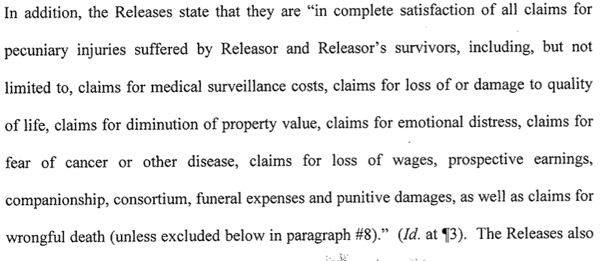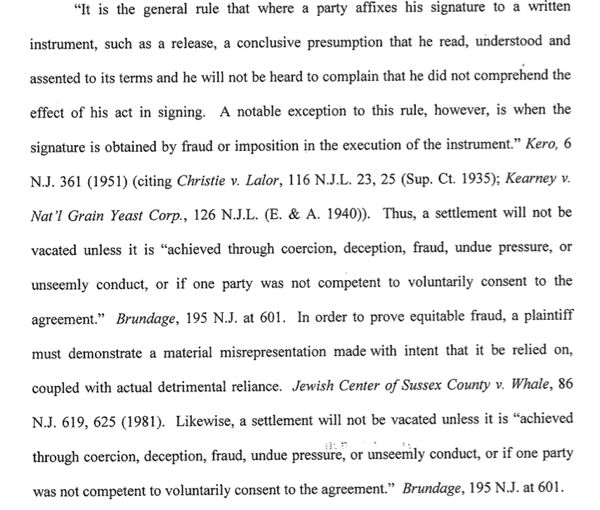Court Upholds Sham Settlement – Including Waiver of Liability for Wrongful Death
Settlement Was Reached By Dupont’s Deception and Fraud
My friends in Pompton Lakes just sent me a recent Superior Court decision, granting defendant Dupont’s motion for summary judgment and dismissal of a lawsuit from residents of Pompton Lakes, who had claimed various adverse health, emotional, and economic harms from Dupont’s toxic pollution. (you can read the decision here).
The Court again ruled that the lawsuit, among other reasons, was barred by a prior Settlement agreement in which hundreds of Pompton lakes residents waived all rights to sue Dupont. I’ve written about previous Court decisions along these lines, see: F is for Fraud – S is for Shame – and D is for Dupont
But, I was not aware, and shocked to read, for the first time, about not only the scope of the liability waiver under those prior settlements, but the specific damages waived.
Among many other things, remarkably, residents of Pompton Lakes even waived their right to sue Dupont for wrongful death! (see the opinion on page 16)
Dupont lawyers must be proud of the fact that they’ve created a liability free zone – a proverbial license to kill, with impunity.
Dupont already seems to have Government regulators at DEP and EPA on a short leash, and have blocked regulatory enforcement fines and penalties and strict cleanup accountability for the toxic mess they’ve made
Now, they now have civil immunity in the courts as well.
But, one issue seems to trouble me about the Settlement agreements and I can’t figure out why the lawyers for residents don’t take the issue head on.
The Court noted that
“NJ courts favor the enforcement of settlement agreements as a matter of public policy” (decision, @p.15)
The Court went on to write that Settlement agreements are contracts that are upheld by the courts, except in limited circumstances, which include deception and fraud: (opinion on page 17):
The court concluded that
In general, settlement agreements will be honored “absent a demonstration of faux or compelling circumstances”.
But the plaintiff’s attorneys and the Court apparently did not brief or probe the issues of fraud, deception, and compelling circumstances.
As I have written, in my opinion the Dupont Pompton Lakes case involved years of deception, fraud, and compelling circumstance, amounting to a massive coverup of an imminent and substantial public health emergency (see: The Great Dupont Train RCRA).
Basically, in my opinion Dupont engaged in “unseemly behavior” and knowingly withheld critically important information about the presence of and the health risk of vapor intrusion.
People can not knowingly consent and waive liability when they are not aware of material facts that have been withheld from them. They literally could not comprehend the settlement they signed and could not have knowingly entered into that settlement or been competent to sign it.
In my opinion Dupont did so in bad faith, because those facts, if known at the time, would directly impact any settlement agreement and create huge new liabilities for Dupont.
No way would residents have signed away their ability to sue Dupont for vapor intrusion had they known about the problem to the extent Dupont did.
The plaintiff relied on the facts available to them in entering the settlement.
Dupont’s failure to disclose material facts about vapor intrusion constituted a massive deception and fraud upon which the plaintiff’s relied.
So why haven’t these issues been litigated?
So, legal eagles out there, tell me why? What exactly am I missing here?



Pingback: juventus turin ausw?rts trikot
Pingback: airmax thea
Pingback: celine bags shop online
Pingback: cheap gucci belts
Pingback: ray ban optical glasses